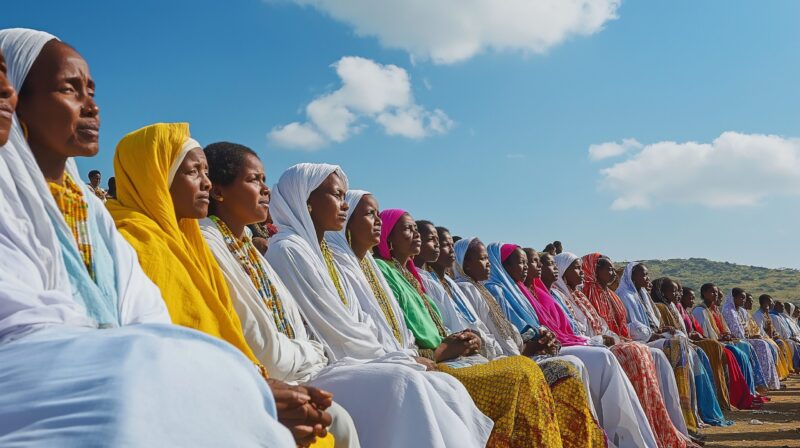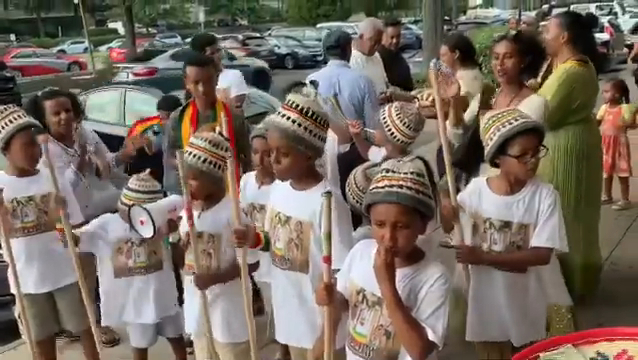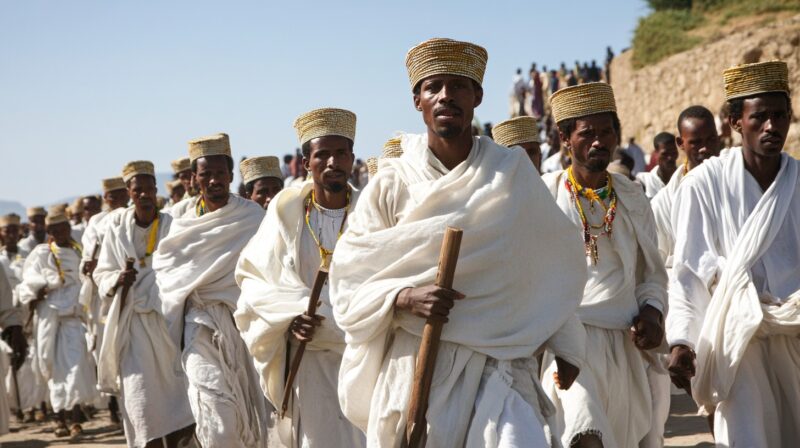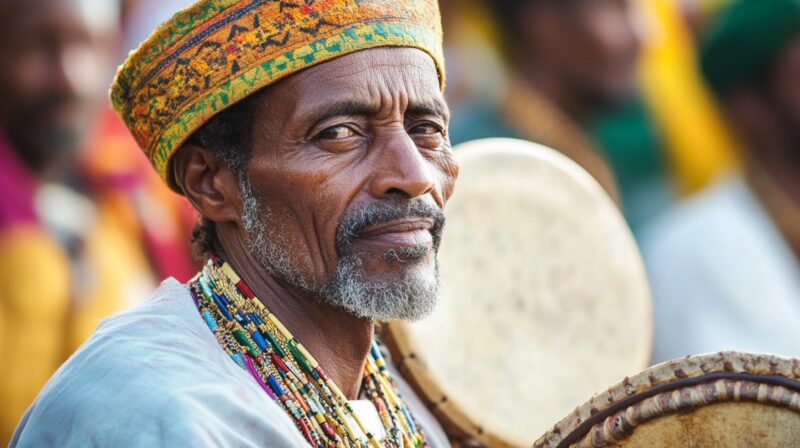Ethiopia is a land rich in history, culture, and spiritual significance. Throughout the year, various festivals reveal the heart and soul of the nation’s traditions and beliefs. From colorful displays of music and dance to deeply meaningful religious ceremonies, these events captivate and inspire those who experience them.
What makes Ethiopia’s festivals truly special is their ability to offer a deep connection to the country’s vibrant cultural heritage. By attending these spiritual celebrations, you gain a unique insight into the unity and diversity that define Ethiopia.
Each festival shows the enduring faith and communal spirit of the Ethiopian people, providing memories and experiences that last a lifetime.
10. Hosanna

Hosanna, also known as Palm Sunday, marks the start of Holy Week in Ethiopia. This festival is celebrated by the Ethiopian Tewahedo Church. It commemorates the triumphant entry of Jesus into Jerusalem, where people welcomed Him with palm branches.
During Hosanna, you will see colorful processions and ceremonies. People carry palm fronds and sometimes wear them as crowns or crosses. The streets are filled with singing and chanting, creating a lively atmosphere. You get to witness the community’s strong faith and deep-rooted traditions.
Churches are often decorated beautifully, and special prayers are recited. The celebration usually includes readings from Saint John’s Gospel about the events of Palm Sunday. Children play a significant role in these festivities. They often lead the processions, singing joyful songs and waving palm branches.
This adds a unique, family-oriented touch to the event. It is a blend of faith, tradition, and community spirit. This festival offers you a deeper look into the Ethiopian Orthodox Christian customs and their profound religious significance.
9. Hidar Tsion
Hidar Tsion is one of Ethiopia’s major spiritual festivals. It is dedicated to the Virgin Mary and is celebrated in the city of Axum. Thousands of people, both locals and international visitors, gather to take part in the event. The festival honors the believed presence of the Ark of the Covenant in Axum.
This makes the celebration deeply significant for Ethiopian Orthodox Christians. It takes place annually on November 30th (or December 1st in leap years), which corresponds to Hidar 21 in the Ethiopian calendar. Participants attend vibrant ceremonies at the St. Mary of Zion Church.
They engage in prayers, singing, and dancing, creating a lively and spiritual atmosphere. The city’s streets are filled with processions and various religious activities. Hidar Tsion is also attended by high-ranking church officials.
The Ethiopian Orthodox Tewahedo Church’s Patriarch often participates, adding to the event’s importance. Local and regional leaders may also join the festivities. Experiencing Hidar Tsion offers a unique insight into Ethiopia’s rich religious traditions.
The festival not only showcases spiritual devotion but also highlights the historical significance of Axum. It’s a memorable event that leaves a lasting impression on all who attend.
To discover more about the rich history, culture, and important travel tips, check out things to know about Ethiopia here.
8. Lideta Mariam
Ver esta publicação no Instagram
Lideta Mariam is a significant spiritual festival in Ethiopia, celebrating the birth of the Blessed Virgin Mary.
It takes place annually on May 1st in the Ethiopian calendar. This festival is marked by joyous celebrations and communal gatherings.
Families and neighbors come together to celebrate this special occasion. It’s common to see homes decorated and festive meals prepared. If possible, a sheep is slaughtered, and tibbs, a popular Ethiopian dish, is enjoyed by all. The celebrations include religious services and prayers in the Ethiopian Orthodox Tewahedo Church.
Attendees often sing hymns and take part in traditional rituals. These activities highlight the deep cultural and spiritual significance of Lideta Mariam. In some communities, the festival coincides with Orthodox Ascension Day, making the observance even more special.
This adds a layer of richness to the celebrations, blending traditions and enhancing the festive atmosphere.
Experiencing Lideta Mariam offers a glimpse into the nation’s rich religious tapestry. It emphasizes the importance of community, faith, and tradition in Ethiopian society. This festival stands as a pillar of cultural identity and spiritual devotion.
7.Kulubi Gabriel
Kulubi Gabriel is a major spiritual festival celebrated in Ethiopia. It takes place on December 19 in the Ethiopian calendar, which corresponds to December 28 in the Gregorian calendar. This festival honors Saint Gabriel, one of the archangels in Christian tradition.
The festival is held at the Saint Gabriel Church in Kulubi. The church was built in 1880 and has since become an important pilgrimage site. People travel from all over Ethiopia and beyond to attend. The church is located about 68 kilometers from Dire Dawa, making it accessible for many visitors.
Orthodox Tewahedo Christians mark the occasion with colorful processions. During the celebration, pilgrims often dress in traditional white clothing, symbolizing purity. Many believers walk long distances to reach the church, demonstrating their faith and devotion. Once they arrive, they partake in prayer, hymn singing, and other religious activities.
The atmosphere is vibrant and lively, filled with the sounds of prayers and chants. Merchants set up stalls selling religious items, food, and drinks, adding to the festive spirit. Kulubi Gabriel is not just a religious event; it is also a cultural experience. Visitors get to see the deep-rooted traditions and faith of the local people.
6. Buhe

Buhe is celebrated on August 19 by the Ethiopian Orthodox and Eritrean Orthodox Churches. The festival marks the Transfiguration of Jesus on Mount Tabor.
It’s an important cultural and religious event. During Buhe, boys go door to door, singing traditional songs. In return, they receive freshly baked bread called “Mulmul.” These songs and the sharing of bread help strengthen community bonds. Another activity involves tying bundles of sticks called chibo.
These are set on fire as part of the celebrations. The sight of chibos burning at night is memorable and cherished by participants. Buhe’s enduring presence speaks volumes about the value placed on preserving cultural traditions in Ethiopia. The festival brings people together and fosters a sense of community and identity.
5. Genna
Genna, also known as Lidet or the Ethiopian Christmas, is celebrated on January 7. This date is based on the Julian calendar.
Genna holds great significance in the Ethiopian Orthodox Church. The celebrations begin on the eve of Genna with church services that go well into the night. Priests and congregants dress in white robes, and the churches are often lit with candles. On the morning of Genna, people typically attend a special mass.
After the service, families gather to share traditional meals. The dishes often include doro wat (chicken stew) and injera (flatbread). Fasting is a common practice leading up to Genna. Many people fast from animal products for several weeks before the festival. This practice is meant to purify the body and spirit.
One unique feature of Genna is the traditional game also called “genna.”
It’s similar to hockey and is said to have been played by shepherds the night Jesus was born. This game is played with great enthusiasm in rural areas. Genna provides a chance for you to see and participate in centuries-old traditions. This festival captures the essence of Ethiopian culture with its rich religious and social practices.
4. Fasika

Fasika is the Ethiopian Easter and one of the most important religious holidays in Ethiopia. Observed by millions of Orthodox Christians, Fasika typically occurs in April. Before celebrating Fasika, there is a 55-day period of fasting called Hudade or the Great Lent.
During this time, people abstain from meat, dairy, and other animal products. The night before Fasika, believers participate in a lengthy church service filled with prayers and hymns. The atmosphere is both solemn and joyful as people prepare to celebrate the resurrection of Christ.
On Fasika day, families come together to enjoy a feast. Traditional foods like doro wat (chicken stew) and injera (flatbread) are usually served. The day is marked by communal gatherings and a spirit of sharing and joy. Fasika is not just a day of celebration but a culmination of spiritual preparation.
Through fasting and prayers, believers engage deeply with their faith. This makes Fasika a profound and meaningful festival.
3. Enkutatash
Enkutatash marks the Ethiopian New Year. Celebrated on Meskerem 1 in the Ethiopian calendar, it usually falls on September 11 in the Gregorian calendar. This holiday is a time for families to come together and celebrate the end of the rainy season. The name “Enkutatash” means “gift of jewels.”
It reflects the story of the Queen of Sheba returning from a trip to visit King Solomon. Her chiefs welcomed her with jewels. Today, this tradition continues with people giving gifts to loved ones and friends. Enkutatash is deeply rooted in Ethiopian culture. Celebrations often involve attending church services in the morning.
People dress in traditional white clothing called “Habesha Libs.” Music and dancing are also common parts of the festivities. Children play a significant role during Enkutatash. They go from house to house, singing songs and receiving small gifts or money. This practice adds a communal and joyful atmosphere to the celebrations.
You will also notice that flowers, especially the Meskel flower, are important symbols of the holiday. These flowers bloom at this time of year, signaling the start of new beginnings and the end of the rainy season.
It’s a celebration that brings people together, blending traditions and modernity into a harmonious event.
2. Meskel
View this post on Instagram
Meskel is a significant festival in Ethiopia, celebrated by the Ethiopian Orthodox Church. The word “Meskel” means “cross” in Ge’ez, an ancient Ethiopian language. This holiday commemorates the finding of the True Cross by Empress Helena in the fourth century.
The celebration begins on the evening of September 26th with “Demera,” a large bonfire. Families and communities gather to light the bonfire, which symbolizes the fire Empress Helena used to find the True Cross. The event is filled with chants, prayers, and traditional songs.
Meskel also involves colorful processions and ceremonies. People dress in their finest traditional clothing. The streets are decorated with flowers and Meskel daisies. Priests and deacons participate in the joyous processions, carrying crosses and icons while singing hymns.
This festival fosters a strong sense of unity and renewal among Ethiopians. It is a time for people to come together, reconcile differences, and strengthen community bonds. The Meskel celebration has been recognized by UNESCO for its cultural significance.
If you are in Ethiopia during Meskel, you will see a unique blend of religion, culture, and community spirit. It is a vibrant and meaningful event that showcases the rich traditions of Ethiopian Orthodox Christianity. It is a must-see for anyone interested in experiencing Ethiopia’s spiritual and cultural heritage.
1. Timkat
Timkat, also known as the Epiphany, is one of Ethiopia’s most significant religious celebrations. This festival commemorates the baptism of Jesus Christ in the Jordan River.
Held annually on January 19th (or January 20th in leap years), it is marked by vibrant and communal festivities. You can expect colorful processions led by priests carrying tabots, replicas of the Ark of the Covenant. These tabots are taken out of churches and paraded to a nearby body of water.
The event is filled with prayers, hymns, and traditional dances. In cities like Gondar, Lalibela, and Addis Ababa, Timkat draws large crowds. The night before, known as Ketera, is also an essential part of the celebration. During this time, people gather for prayers and chanting.
When you attend Timkat, you’ll see participants dressed in their finest traditional attire. The air is filled with the sounds of rhythmic drums and spiritual songs. The vibrant decorations and heartfelt prayers make it an unforgettable experience.
This festival is not only a religious event but also a time for community bonding. It brings together people from different backgrounds to celebrate faith and culture.
The Bottom Line
Experiencing Ethiopia’s spiritual festivals is a unique journey through its rich cultural heritage.
These festivals showcase a blend of religious traditions, vibrant ceremonies, and communal harmony.
Participating in these events provides insight into the deep-rooted customs and practices of Ethiopian people.

